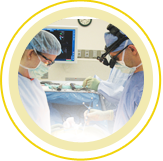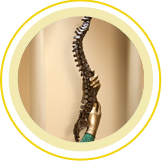Most people connect dizziness to inner ear problems, low blood pressure, or dehydration—but rarely to the spine. However, issues in the cervical spine (the portion of the spine located in the neck) can disrupt the body’s balance system and contribute to episodes of dizziness, unsteadiness, or a sensation of spinning.
If you’ve been feeling “off-balance” and haven’t found answers, understanding the role of the cervical spine may help point you toward relief. 
How the Cervical Spine Helps You Maintain Balance
The cervical spine is more than a supportive structure. It contains:
- Nerves that send information to the brain about body position
- Muscles that help stabilize your head and neck
- Joints and ligaments that coordinate movement
These structures communicate constantly with your eyes and inner ear, allowing your brain to interpret motion and orientation. When something disrupts that communication, the brain may receive conflicting signals. That’s what can lead to dizziness or imbalance.
Common causes include:
- Arthritis or spinal degeneration
- Herniated discs
- Whiplash or other neck trauma
- Muscle tension and inflammation
- Poor posture (especially from prolonged device use)
- Nerve compression
This type of imbalance-related dizziness is often referred to as cervicogenic dizziness or cervical vertigo.
Common Symptoms of Cervicogenic Dizziness
Symptoms can vary from person to person, but may include:
- Dizziness or unsteadiness triggered by neck movement
- Neck pain or stiffness accompanied by dizzy spells
- Limited range of motion in the neck
- Headaches at the base of the skull
- Difficulty focusing or blurred vision
- Nausea, especially after quick head turns or looking up
Symptoms may come and go, or they may worsen after prolonged sitting, driving, or screen time.
Diagnostic Tests for Cervicogenic Dizziness
Cervicogenic dizziness can be challenging to identify because its symptoms overlap with those of vestibular (inner ear), neurological, and cardiovascular conditions. No single test can confirm it. Because of this, many patients see multiple providers before discovering the cervical spine as the source of their imbalance.
A spine specialist or neurologist will perform a comprehensive evaluation to rule out other causes. Testing may include:
Physical Examination
Assessment of:
- Posture
- Neck mobility
- Muscle tightness and tenderness
- Gait and balance
Imaging Studies
Such as:
- X-rays
- MRI
- CT scans
These help identify inflammation, degeneration, disc herniation, or nerve compression.
Balance and Vestibular Testing
Specialized testing may evaluate how the brain responds to:
- Motion
- Visual cues
- Changes in head position
Once other conditions are ruled out, and symptoms correlate with neck-related issues, cervicogenic dizziness can be diagnosed with more confidence.
Treatment Options for Spine-Related Dizziness
The encouraging news: Most patients improve significantly once the underlying cervical issue is treated. Your spine specialist may recommend a customized combination of therapies, such as:
Physical Therapy
Designed to:
- Improve posture
- Increase neck mobility
- Strengthen stabilizing muscles
This can correct faulty movement patterns contributing to dizziness.
Manual Therapy or Chiropractic Care
Gentle, controlled techniques may relieve joint dysfunction and reduce nerve irritation.
Medications
Short-term use may help manage:
- Inflammation
- Muscle spasms
- Related pain
Vestibular Rehabilitation
Specialized exercises retrain how your brain interprets balance signals and can reduce dizziness.
Lifestyle Modifications
Your care plan may include:
- Ergonomic adjustments at work
- Stretching routines
- Stress-reduction techniques
- Sleep position recommendations
Minimally Invasive Procedures
In cases involving significant disc herniation or spinal compression, targeted injections or minimally invasive surgery may be discussed.
When to See a Spine Specialist
Consider seeing a spine specialist if you experience:
- Persistent dizziness or imbalance
- Neck pain that accompanies dizzy spells
- Difficulty focusing your eyes
- Headaches at the base of the skull
- Worsening symptoms with head or neck movement
Left untreated, underlying neck conditions may progress, increasing discomfort and instability over time.
Cervicogenic Dizziness: The Bottom Line
While dizziness is often linked to inner ear or neurological issues, the cervical spine can also be an overlooked contributor. But, with the right diagnosis and treatment plan, most patients experience meaningful improvement in balance, comfort, and quality of life.
If dizziness is affecting your daily activities, sleep, or confidence, schedule a consultation today with our spine specialists at Spine & Scoliosis Specialists in Greensboro, NC. Identifying the true source of your symptoms is the first step toward restoring balance and peace of mind.



